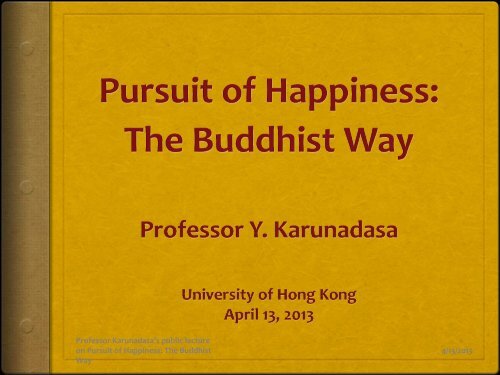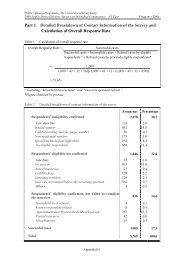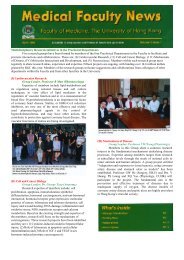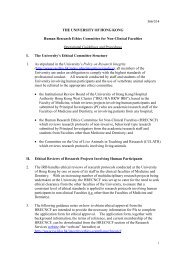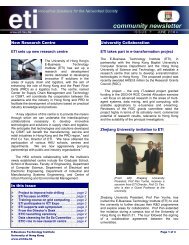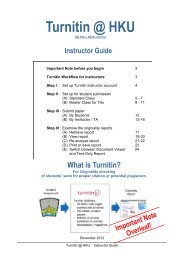Pursuit of Happiness: The Buddhist Way
Pursuit of Happiness: The Buddhist Way
Pursuit of Happiness: The Buddhist Way
You also want an ePaper? Increase the reach of your titles
YUMPU automatically turns print PDFs into web optimized ePapers that Google loves.
Pr<strong>of</strong>essor Karunadasa’s public lectureon <strong>Pursuit</strong> <strong>of</strong> <strong>Happiness</strong>: <strong>The</strong> <strong>Buddhist</strong><strong>Way</strong>4/13/2013
<strong>Pursuit</strong> <strong>of</strong> <strong>Happiness</strong> “All living beings”, says the Buddha, “desire happinessand recoil from suffering” (sabbe sattā sukha-kāmādukkha-paṭikkūlā). Yet, “what the Buddha calls true happiness, others call itsuffering. What others call suffering, the Buddha calls ittrue happiness”. It is in this context that the Buddha says:“<strong>The</strong>re are some divines (brahmanas) and philosophers(samanas), who call the day the night and the night the day.I say that this is an abiding in delusion on their part.”Pr<strong>of</strong>essor Karunadasa’s public lecture on<strong>Pursuit</strong> <strong>of</strong> <strong>Happiness</strong>: <strong>The</strong> <strong>Buddhist</strong> <strong>Way</strong>2 4/13/2013
What, then, is happiness?How can we define happiness? It is not possible to define happiness with mathematicalprecision. <strong>The</strong>re are some who argue that what constituteshappiness is purely subjective, relativistic, emotive,or attitudinal. <strong>The</strong>y also maintain that sources <strong>of</strong>happiness cannot be properly identified. On this issue,Buddhism takes a different position. <strong>The</strong> <strong>Buddhist</strong> position is that there is an inseparableconnection between morality and happiness: What ismorally good leads to happiness. What is morally badleads to unhappiness.Pr<strong>of</strong>essor Karunadasa’s public lecture on<strong>Pursuit</strong> <strong>of</strong> <strong>Happiness</strong>: <strong>The</strong> <strong>Buddhist</strong> <strong>Way</strong>3 4/13/2013
Morality and <strong>Happiness</strong> <strong>The</strong> <strong>Buddhist</strong> term for what is morally good is “skillful”(kusala), and the <strong>Buddhist</strong> term for what is morally badis “unskillful” (akusala). Accordingly, a mind which ispoisoned with the three poisons <strong>of</strong> greed, hatred, anddelusion is a mind that is “unskillful” (morally bad),a mind that is “defiled”, a mind that is “ill”, a mind thatis “in bondage” — in other words, a mind that “suffers”.On the other hand, a mind that is free from the threepoisons is a mind that is “skillful” (morally good),a mind that is “pure”, a mind that is “well”, a mind that is“in freedom” — in other words, a mind that is “happy”.Pr<strong>of</strong>essor Karunadasa’s public lecture on<strong>Pursuit</strong> <strong>of</strong> <strong>Happiness</strong>: <strong>The</strong> <strong>Buddhist</strong> <strong>Way</strong>4 4/13/2013
Morality and <strong>Happiness</strong>(continue)Buddhism says that when we have “skillful”qualities, we experience mental health (arogya),mental purity (anavajjata), mental ability(cheka) — all resulting in happiness (sukhavipaka).Pr<strong>of</strong>essor Karunadasa’s public lecture on<strong>Pursuit</strong> <strong>of</strong> <strong>Happiness</strong>: <strong>The</strong> <strong>Buddhist</strong> <strong>Way</strong>5 4/13/2013
<strong>Happiness</strong> and Psychology - IIf negative mental dispositions, such as anger andjealousy, are called “unskillful”, it is because they makeus unskillful; they impair our mental and physical healthand lead to our unhappiness. And if positive mentaldispositions, such as compassionate love and kindness,are called “skillful”, it is because they make us skillful;they enhance our mental and physical health and, thus,promote our happiness.Pr<strong>of</strong>essor Karunadasa’s public lecture on<strong>Pursuit</strong> <strong>of</strong> <strong>Happiness</strong>: <strong>The</strong> <strong>Buddhist</strong> <strong>Way</strong>6 4/13/2013
<strong>Happiness</strong> and Psychology - II<strong>The</strong>refore, the <strong>Buddhist</strong> moral evaluation interms <strong>of</strong> “skillful” and “un-skillful” is basedon psychology, on a distinction made betweenpositive mental dispositions which promoteour happiness, on the one hand, and negativemental dispositions which lead to our suffering,on the other.Pr<strong>of</strong>essor Karunadasa’s public lecture on<strong>Pursuit</strong> <strong>of</strong> <strong>Happiness</strong>: <strong>The</strong> <strong>Buddhist</strong> <strong>Way</strong>7 4/13/2013
<strong>The</strong> Two Options Before UsIf we want to be happy, there are in fact two optionsbefore us: One option is to change the nature <strong>of</strong> theworld to suit our desires. <strong>The</strong> other option is tochange ourselves to be in harmony with the nature <strong>of</strong>the world. It is the second option, though difficult,that Buddhism adopts, because the first option issimply not possible.Pr<strong>of</strong>essor Karunadasa’s public lecture on<strong>Pursuit</strong> <strong>of</strong> <strong>Happiness</strong>: <strong>The</strong> <strong>Buddhist</strong> <strong>Way</strong>8 4/13/2013
How can we be truly happy?How can we have sustainable happiness? According to the Buddha:It is only when we have a mind under ourown control that we can be truly happy,not when we come under the control <strong>of</strong>our own mind.Pr<strong>of</strong>essor Karunadasa’s public lecture on<strong>Pursuit</strong> <strong>of</strong> <strong>Happiness</strong>: <strong>The</strong> <strong>Buddhist</strong> <strong>Way</strong>9 4/13/2013
<strong>The</strong> Cognitive Process Depending on the eye and the eye-object arises eyeconsciousness.<strong>The</strong> correlation (union) <strong>of</strong> the three is sensorycontact. Depending on sensory contact arises feeling. What one feels, that one perceives. What one perceives,that one examines. What one examines, that one makesmanifold. What one makes manifold, due to that conceptualproliferations begin to overwhelm the individual, dragginghis mind to similar objects that he has seen in the past andsimilar objects that he expects to see in the future.Pr<strong>of</strong>essor Karunadasa’s public lecture on<strong>Pursuit</strong> <strong>of</strong> <strong>Happiness</strong>: <strong>The</strong> <strong>Buddhist</strong> <strong>Way</strong>11 4/13/2013
<strong>The</strong> Cognitive Process(continue)If the object appears as something pleasant, he willbe assailed by greed-driven thoughts. If the objectappears as something distractive (repulsive), he willbe assailed by hatred-driven thoughts. If the objectappears as something neither pleasant nor unpleasant,he will be assailed by delusion-driven thoughts.At this level, the individual becomes a hapless object<strong>of</strong> his own uncontrollable conceptual proliferations.Pr<strong>of</strong>essor Karunadasa’s public lecture on<strong>Pursuit</strong> <strong>of</strong> <strong>Happiness</strong>: <strong>The</strong> <strong>Buddhist</strong> <strong>Way</strong>12 4/13/2013
<strong>The</strong> Cognitive Process:<strong>The</strong> Three Stages In the cognitive process, sketched above, we canidentify three stages:1) <strong>The</strong> eye-consciousness arises according to theprinciple <strong>of</strong> dependent arising (paṭicca-samuppāda).2) From “feeling” up to “conceptual proliferation”,the individual assumes the role <strong>of</strong> an agent anddirects the cognitive process.Pr<strong>of</strong>essor Karunadasa’s public lecture on<strong>Pursuit</strong> <strong>of</strong> <strong>Happiness</strong>: <strong>The</strong> <strong>Buddhist</strong> <strong>Way</strong>13 4/13/2013
<strong>The</strong> Cognitive Process:<strong>The</strong> Three Stages3) <strong>The</strong> individual loses his role as the agent, and becomesan object <strong>of</strong> his own uncontrollable conceptualproliferations. In other words, the individual comesunder the control <strong>of</strong> his own mind. If the individual becomes an object <strong>of</strong> his ownconceptual proliferations, what this really means isthat he does not have a mind under his own control.Pr<strong>of</strong>essor Karunadasa’s public lecture on<strong>Pursuit</strong> <strong>of</strong> <strong>Happiness</strong>: <strong>The</strong> <strong>Buddhist</strong> <strong>Way</strong>14 4/13/2013
<strong>Happiness</strong> and MindfulnessIn order to have a mind under our own control,we need to develop mindfulness (sati) andclear comprehension (sampajañña).Pr<strong>of</strong>essor Karunadasa’s public lecture on<strong>Pursuit</strong> <strong>of</strong> <strong>Happiness</strong>: <strong>The</strong> <strong>Buddhist</strong> <strong>Way</strong>15 4/13/2013
<strong>Happiness</strong> and Mindfulness(continue) “When one is going forward or returning, when one islooking ahead or looking aside, when one is drawing in orextending the limbs, when wearing one’s clothes, wheneating, drinking, chewing and tasting , when defecating andurinating, when walking, standing, sitting, falling asleep,waking up, speaking, and keeping silent” — in all theseactivities and occasions one should have mindfulness andclear comprehension.[Stipatthana-Sutta in Majjhima-Nikaya] To be mindful is not the same as to be self-conscious.Pr<strong>of</strong>essor Karunadasa’s public lecture on<strong>Pursuit</strong> <strong>of</strong> <strong>Happiness</strong>: <strong>The</strong> <strong>Buddhist</strong> <strong>Way</strong>16 4/13/2013
What prevents us fromexperiencing happinessWhat prevents us from experiencing truehappiness are the Three Poisons: Greed,Hatred, and Delusion. <strong>The</strong>y are calledpoisons because they corrode our mental andphysical health and destroy our happiness.Pr<strong>of</strong>essor Karunadasa’s public lecture on<strong>Pursuit</strong> <strong>of</strong> <strong>Happiness</strong>: <strong>The</strong> <strong>Buddhist</strong> <strong>Way</strong>17 4/13/2013
Of these three poisons,what is the most poisonous?What is the most corrosive?It is neither greed nor delusionbut hatred.Pr<strong>of</strong>essor Karunadasa’s public lecture on<strong>Pursuit</strong> <strong>of</strong> <strong>Happiness</strong>: <strong>The</strong> <strong>Buddhist</strong> <strong>Way</strong>18 4/13/2013
This is because:1) A mind motivated by greed can give rise to pleasure(somanassa) or indifference (upekkha). But it nevergives rise to displeasure (domanassa).2) A mind motivated by delusion gives rise toindifference. But it never gives rise to displeasure.3) On the other hand, a mind motivated by hatredalways gives rise to displeasure.Pr<strong>of</strong>essor Karunadasa’s public lecture on<strong>Pursuit</strong> <strong>of</strong> <strong>Happiness</strong>: <strong>The</strong> <strong>Buddhist</strong> <strong>Way</strong>19 4/13/2013
<strong>The</strong> Wretchedness <strong>of</strong> Anger1. “When anger does possess a man,He looks ugly and lies in pain.”[Anguttaranikaya <strong>of</strong> the Pali <strong>Buddhist</strong> Canon]Pr<strong>of</strong>essor Karunadasa’s public lecture on<strong>Pursuit</strong> <strong>of</strong> <strong>Happiness</strong>: <strong>The</strong> <strong>Buddhist</strong> <strong>Way</strong>20 4/13/2013
<strong>The</strong> Wretchedness <strong>of</strong> Anger(continue)2) Through anger people kill not only others, but they kill themselves (suicide):“No being but seeks his own self’s good,None dearer to him than himself,Yet men in anger kill themselves,Distraught for reasons manifold:For crazed they stab themselves with daggers,In desperation swallow poison,Perish hanged by ropes, or fling<strong>The</strong>mselves over a precipice.Yet how their-life-destroying actsBring death unto themselves as well,That they cannot discern, and thatIs the ruin anger breeds.”Pr<strong>of</strong>essor Karunadasa’s public lecture on<strong>Pursuit</strong> <strong>of</strong> <strong>Happiness</strong>: <strong>The</strong> <strong>Buddhist</strong> <strong>Way</strong>[Anguttaranikaya <strong>of</strong> the Pali <strong>Buddhist</strong> Canon]21 4/13/2013
What is the most effective antidote,the most effective medicine to prevent ourgetting poisoned by the poison <strong>of</strong> hatred?It is loving kindness(Mettā).Pr<strong>of</strong>essor Karunadasa’s public lecture on<strong>Pursuit</strong> <strong>of</strong> <strong>Happiness</strong>: <strong>The</strong> <strong>Buddhist</strong> <strong>Way</strong>22 4/13/2013
This is how, the Buddha says,one should develop loving kindness: “Whatever living beings there be: feeble or strong, tall,stout or medium, short, small or large, without exception,seen or unseen, those dwelling far or near, those who areborn or those who are to be born, may all beings be happy.” Let none deceive another, nor despise any personwhatsoever in any place. Let one not wish any harmto another out <strong>of</strong> anger or ill-will.Pr<strong>of</strong>essor Karunadasa’s public lecture on<strong>Pursuit</strong> <strong>of</strong> <strong>Happiness</strong>: <strong>The</strong> <strong>Buddhist</strong> <strong>Way</strong>23 4/13/2013
This is how, the Buddha says,one should develop loving kindness: Just as a mother would protect her only child at the risk <strong>of</strong>her own life, even so, let one cultivate a boundless heart <strong>of</strong>compassion towards all beings. Let one’s thoughts <strong>of</strong>boundless compassion pervade the whole world: above,below and across without any obstruction, without anyhatred, without any enmity. Whether one stands, walks, sits or lies down, as long asone is awake, one should develop this mindfulness.This is the noblest living here.[ Suttanipāta <strong>of</strong> the Pāli <strong>Buddhist</strong> Canon]Pr<strong>of</strong>essor Karunadasa’s public lecture on<strong>Pursuit</strong> <strong>of</strong> <strong>Happiness</strong>: <strong>The</strong> <strong>Buddhist</strong> <strong>Way</strong>24 4/13/2013
<strong>The</strong>re are eleven blessings, the Buddha says,which one can have by developing loving kindness:1. One sleeps in comfort.2. One wakes up in comfort.3. One dreams no evil dreams.4. One is dear to human beings.5. One is dear to non-human beings.6. <strong>The</strong> deities protect him.7. No fire or poison or weapon harms him.8. One’s mind can be easily concentrated.9. <strong>The</strong> complexion <strong>of</strong> one’s face becomes serene.10. One will face death with no mental confusion.11. Even if one fails to realize the highest goal in this life,he/she will pass on to the world <strong>of</strong> High Divinity (Brahma-loka).Pr<strong>of</strong>essor Karunadasa’s public lecture on<strong>Pursuit</strong> <strong>of</strong> <strong>Happiness</strong>: <strong>The</strong> <strong>Buddhist</strong> <strong>Way</strong>25 4/13/2013
<strong>Happiness</strong> through the Four Sublime Statesor Divine Abodes (Brahma-Vihāra)a) Loving Kindness (Mettā): It is love, without the desire topossess. It is love, without selecting and excluding. It is love,embracing all living beings. Loving Kindness should bedistinguished from selfish affection. <strong>The</strong> Buddha advises hisdisciples to live merged together in their minds through mutuallove like water and milk mixing together. (M. I 207)b) Compassion (Karuṇā): It is compassion to all suffering livingbeings. Compassion is not the same as sentimentality.Sentimentality is a state <strong>of</strong> mind accompanied by sorrow.Pr<strong>of</strong>essor Karunadasa’s public lecture on<strong>Pursuit</strong> <strong>of</strong> <strong>Happiness</strong>: <strong>The</strong> <strong>Buddhist</strong> <strong>Way</strong>26 4/13/2013
<strong>Happiness</strong> through the Four Sublime Statesor Divine Abodes (Brahma-Vihāra) (continue)c) Altruistic Joy (Muditā): It is the ability to feel happy and joyful atthe success <strong>of</strong> another. It is the sharing <strong>of</strong> others’ happiness as if itwere ours. Altruistic Joy is the best antidote, the best medicine forthe poison <strong>of</strong> jealousy. Jealousy is the resentment and bitterness oneexperiences when another succeeds.d) Equanimity (Upekkhā): It is the perfect, unshakable balance <strong>of</strong>mind. It is not negative indifference, but a positive social virtue.Equanimity is our ability to remain calm and unruffled when weface “the eight vicissitudes”, or “the eight ups and downs <strong>of</strong> life”(aṭṭha lokadhammā). <strong>The</strong>se are: gain and loss (lābho alābho),blame and honour (ayaso yaso ca), insult and praise (nindapasaṃsā), delight and despair (sukhañ ca dukkhaṃ).Pr<strong>of</strong>essor Karunadasa’s public lecture on<strong>Pursuit</strong> <strong>of</strong> <strong>Happiness</strong>: <strong>The</strong> <strong>Buddhist</strong> <strong>Way</strong>27 4/13/2013
<strong>Happiness</strong> through the Four Sublime Statesor Divine Abodes (Brahma-Vihāra) (continue)e) Equanimity does also mean an attitude <strong>of</strong>impartiality. As such, equanimity enables usto transcend all divisive thoughts and feelingsbased on caste (caste-ism), race (racism),nationality (nationalism), ethnicity and otherforms <strong>of</strong> parochialism, as well as genderdistinctions.Pr<strong>of</strong>essor Karunadasa’s public lecture on<strong>Pursuit</strong> <strong>of</strong> <strong>Happiness</strong>: <strong>The</strong> <strong>Buddhist</strong> <strong>Way</strong>28 4/13/2013
Indeed, this is an ancient practice,Not one only <strong>of</strong> today;<strong>The</strong>y blame those who remain silent.<strong>The</strong>y blame those who speak much,<strong>The</strong>y blame those who speak in moderation.<strong>The</strong>re is none in this worldWho is not blamed.<strong>The</strong>re never was,<strong>The</strong>re never will be,Nor is there now,A person who is wholly blamedOr wholly praised.Pr<strong>of</strong>essor Karunadasa’s public lecture on<strong>Pursuit</strong> <strong>of</strong> <strong>Happiness</strong>: <strong>The</strong> <strong>Buddhist</strong> <strong>Way</strong>[Dhammapada]29 4/13/2013
How can we laymen, we who are notmonks or nuns, achieve happiness?<strong>The</strong> Buddha calls us “the lay people who enjoysense-pleasures” (gihī kāmabhogino). To us aslaymen, the Buddha has given many instructionsas to how we can lead a happy life, while beinglay people enjoying sense-pleasures.Pr<strong>of</strong>essor Karunadasa’s public lecture on<strong>Pursuit</strong> <strong>of</strong> <strong>Happiness</strong>: <strong>The</strong> <strong>Buddhist</strong> <strong>Way</strong>30 4/13/2013
<strong>Happiness</strong> and Wealth One <strong>of</strong> the most important prerequisites to lead a happy lifeis adequate wealth. As a religious teacher the Buddha neverpraised poverty. As a matter <strong>of</strong> fact, the Buddha singled outpoverty to be the most socially destabilizing factor. In onediscourse (Cakkavattisīhanāda Sutta), the Buddha says:“When there is no proper distribution <strong>of</strong> wealth in thesociety, poverty grows rife; from poverty growing rife,stealing increases; from the spread <strong>of</strong> stealing, violenceand use <strong>of</strong> weapons increases, from violence and use <strong>of</strong>weapons destruction <strong>of</strong> life becomes common, whendestruction <strong>of</strong> life becomes common, people’s life-spandecreases, their beauty decreases.”Pr<strong>of</strong>essor Karunadasa’s public lecture on<strong>Pursuit</strong> <strong>of</strong> <strong>Happiness</strong>: <strong>The</strong> <strong>Buddhist</strong> <strong>Way</strong>31 4/13/2013
Another <strong>Buddhist</strong> discourse says: If the king <strong>of</strong> the kingdom were to think: ‘I will get rid <strong>of</strong> this plague<strong>of</strong> robbers by executions and imprisonments, by confiscation, threatsand banishment’, by such means the plague would not be ended. Those who survive would later harm the kingdom. “<strong>The</strong>re is anotherplan”, the discourse goes on to say, “by which the king can completelyeliminate the plague: To those in the kingdom who are engaged incultivating crops and raising cattle, let Your Majesty distribute grainand fodder; to those in trade, give them capital; to those in governmentservice, assign them proper living wages. <strong>The</strong>n those people, being intent on their own occupations, will notharm the kingdom. Your Majesty’s revenues will be great, the land willbe tranquil and not beset by thieves, and the people, with joy in theirhearts will play with their children, while dwelling in open houses.”Pr<strong>of</strong>essor Karunadasa’s public lecture on<strong>Pursuit</strong> <strong>of</strong> <strong>Happiness</strong>: <strong>The</strong> <strong>Buddhist</strong> <strong>Way</strong>32 4/13/2013
From the <strong>Buddhist</strong> perspective,what indeed is the Highest Wealth? According to the Buddha:“Contentment is the Highest Wealth”(Santuṭṭhi paramaṃ dhanaṃ) [Dhammapada] This is because:1) Even the richest person is poor, if he is notcontent with his wealth;2) Poverty has objective indicators as well asa psychological dimension.Pr<strong>of</strong>essor Karunadasa’s public lecture on<strong>Pursuit</strong> <strong>of</strong> <strong>Happiness</strong>: <strong>The</strong> <strong>Buddhist</strong> <strong>Way</strong>33 4/13/2013
Health and <strong>Happiness</strong>“Among all gains,” says the Buddha,“health is the Highest Gain.”(Arogyā paramā lābhā) [Dhammapada]Pr<strong>of</strong>essor Karunadasa’s public lecture on<strong>Pursuit</strong> <strong>of</strong> <strong>Happiness</strong>: <strong>The</strong> <strong>Buddhist</strong> <strong>Way</strong>34 4/13/2013
Advice to householders onhow to be happy: One day a person called Dīghajānu came to the Buddha,and said:“Lord, we householders are immersed in the round <strong>of</strong>pleasure; we are cumbered with bed-mate and sons;we delight in the muslins from Benares and in sandalwood;we deck ourselves with flowers, with garlands andcosmetics; we enjoy the use <strong>of</strong> both silver and gold.Lord, to such as us, let the Exalted One also teach theDhamma, teach the things which will be conducive toour advantage and happiness here on earth and to ouradvantage and happiness in the world to come.”Pr<strong>of</strong>essor Karunadasa’s public lecture on<strong>Pursuit</strong> <strong>of</strong> <strong>Happiness</strong>: <strong>The</strong> <strong>Buddhist</strong> <strong>Way</strong>35 4/13/2013
In response to this request, the Buddharefers to four requirements which areconducive to happiness in this life:1) Accomplishment in Effort (uṭṭhāna-sampadā): <strong>The</strong> Buddha saysthat it is the honest effort needed to earn one’s living: One mustbe energetic, tireless, <strong>of</strong> an inquiring turn <strong>of</strong> mind and capable <strong>of</strong>organizing and carrying out one’s work systematically andefficiently.2) Requirement for Protection (ārakkha-sampadā): One should seethat the wealth one has earned is properly guarded and protected.3) Good Companionship/Friendship (kalyāṇa-mittatā). One shouldassociate and cultivate friendship with people who are virtuous,who are faithful, charitable, and wise.Pr<strong>of</strong>essor Karunadasa’s public lecture on<strong>Pursuit</strong> <strong>of</strong> <strong>Happiness</strong>: <strong>The</strong> <strong>Buddhist</strong> <strong>Way</strong>36 4/13/2013
In response to this request, the Buddharefers to four requirements which areconducive to happiness in this life:4) <strong>The</strong> Need to lead a Balanced Life (samajīvikatā): “One should neitherbe unduly extravagant nor unduly miserly in one’s living. He shouldknow that his income will stand in excess <strong>of</strong> his expenditure, but nothis expenses in excess <strong>of</strong> his income. Just as the goldsmith knows onholding up a balance that by so much it has dipped down, by so muchit has tilted up; even so a householder, knowing his income andexpenses leads a balanced life, neither extravagant nor miserly.”5) “If a householder with little income were to lead an extravagant life,there would be those who say — ‘this person enjoys his property likeone who eats wood-apples.’ If a householder with a large income wereto lead a wretched life, there would be those who say — ‘This personwill die like a starveling.’”Pr<strong>of</strong>essor Karunadasa’s public lecture on<strong>Pursuit</strong> <strong>of</strong> <strong>Happiness</strong>: <strong>The</strong> <strong>Buddhist</strong> <strong>Way</strong>37 4/13/2013
<strong>The</strong> wealth earned by a householderhas four sources <strong>of</strong> lossa) Debauchery or looseness with womenb) Addiction to intoxicating drinksc) Gamblingd) Associating with evil-minded people.Pr<strong>of</strong>essor Karunadasa’s public lecture on<strong>Pursuit</strong> <strong>of</strong> <strong>Happiness</strong>: <strong>The</strong> <strong>Buddhist</strong> <strong>Way</strong>38 4/13/2013
<strong>The</strong>re are six evil consequencesin indulging in intoxicantsa) Loss <strong>of</strong> wealthb) Increase <strong>of</strong> quarrelsc) Susceptibility to illnessd) Loss <strong>of</strong> one’s good name and reputatione) Shameless and indecent exposure <strong>of</strong> one’s bodyf) Weakening <strong>of</strong> one’s intellect.Pr<strong>of</strong>essor Karunadasa’s public lecture on<strong>Pursuit</strong> <strong>of</strong> <strong>Happiness</strong>: <strong>The</strong> <strong>Buddhist</strong> <strong>Way</strong>39 4/13/2013
<strong>The</strong>re are six evil consequenceswhen one indulges in gamblinga) <strong>The</strong> winner makes enemiesb) <strong>The</strong> loser bewails his lossc) Loss <strong>of</strong> wealthd) His word is not relied upon in a court <strong>of</strong> lawe) He is despised by his friends and associatesf) He is not in demand for marriage, for people wouldsay he is a gambler; how can he look after a wife.Pr<strong>of</strong>essor Karunadasa’s public lecture on<strong>Pursuit</strong> <strong>of</strong> <strong>Happiness</strong>: <strong>The</strong> <strong>Buddhist</strong> <strong>Way</strong>40 4/13/2013
<strong>The</strong>re are six evil consequences inbeing addicted to idleness“<strong>The</strong> idle man does no work, saying:a) That it is extremely coldb) That it is extremely hotc) That it is too early in the morningd) That it is too late in the eveninge) That he is extremely hungryf) That he is too full.”Pr<strong>of</strong>essor Karunadasa’s public lecture on<strong>Pursuit</strong> <strong>of</strong> <strong>Happiness</strong>: <strong>The</strong> <strong>Buddhist</strong> <strong>Way</strong>41 4/13/2013
Causes <strong>of</strong> Downfall (parābhava)1) “Being fond <strong>of</strong> sleep, fond <strong>of</strong> company, indolent,lazy and irritable – this is the cause <strong>of</strong> one’s downfall.”2) “Though being well-to-do, not to support father andmother who are old and past their youth — this is thecause <strong>of</strong> one’s downfall.”3) “To have much wealth and ample gold and food, but toenjoy one’s luxuries alone — this is the cause <strong>of</strong> one’sdownfall.”4) “To be proud <strong>of</strong> birth, <strong>of</strong> wealth or clan, and to despiseone’s own kinsmen — this is a cause <strong>of</strong> one’s downfall.”Pr<strong>of</strong>essor Karunadasa’s public lecture on<strong>Pursuit</strong> <strong>of</strong> <strong>Happiness</strong>: <strong>The</strong> <strong>Buddhist</strong> <strong>Way</strong>42 4/13/2013
Causes <strong>of</strong> Downfall (parābhava)(continue)5) “To be a rake, a drunkard, a gambler, and to squander allone earns – this is a cause <strong>of</strong> one’s downfall.”6) “Not to be contented with one’s own wife, and to be seenwith harlots and the wives <strong>of</strong> others — this is a cause <strong>of</strong>one’s downfall.”7) “Being past one’s youth, to take a young wife and to beunable to sleep for jealousy <strong>of</strong> her — this is a cause <strong>of</strong>one’s downfall.”8) “To place in authority a woman given to drink andsquandering, or a man <strong>of</strong> like behavior — this is a cause<strong>of</strong> one’s downfall.”Pr<strong>of</strong>essor Karunadasa’s public lecture on<strong>Pursuit</strong> <strong>of</strong> <strong>Happiness</strong>: <strong>The</strong> <strong>Buddhist</strong> <strong>Way</strong>43 4/13/2013
<strong>Happiness</strong> through Family Life1) Filial piety or devotion to parents is very much emphasized inBuddhism. According to the Buddha, the parents are the “firstteachers” (pubbācariya), the “first deities” (pubba-devatā),“worthy <strong>of</strong> <strong>of</strong>ferings” (āhuṇeyya). One’s mother and father,the Buddha says, are the Brahma, the Creator God (Brahmā’timātāpitaro).2) When the Buddha was asked who is man’s greatest friend,the Buddha’s reply was: “<strong>The</strong> wife is man’s greatest friend”(Bhariyā ve paramā sakhā).3) Children are man’s greatest wealth (parama vitti).Pr<strong>of</strong>essor Karunadasa’s public lecture on<strong>Pursuit</strong> <strong>of</strong> <strong>Happiness</strong>: <strong>The</strong> <strong>Buddhist</strong> <strong>Way</strong>44 4/13/2013
Children’s Duties to the Parents <strong>The</strong>re are five ways in which a child shouldminister to his mother and father:1) Having been supported by them, I will support them.2) I shall perform their duties for them.3) I shall keep up the family tradition.4) I shall be worthy <strong>of</strong> my heritage.5) After my parents’ death I shall <strong>of</strong>fer alms in honour<strong>of</strong> my departed parents.Pr<strong>of</strong>essor Karunadasa’s public lecture on<strong>Pursuit</strong> <strong>of</strong> <strong>Happiness</strong>: <strong>The</strong> <strong>Buddhist</strong> <strong>Way</strong>45 4/13/2013
Parents’ Duties to the Children <strong>The</strong>re are five ways in which, the parents so ministered bytheir children, will show their compassion to the children:1) <strong>The</strong>y restrain them from evil2) <strong>The</strong>y encourage them to do good.3) <strong>The</strong>y train them for a pr<strong>of</strong>ession.4) <strong>The</strong>y arrange a suitable marriage5) At the proper time, they hand over their inheritanceto them.Pr<strong>of</strong>essor Karunadasa’s public lecture on<strong>Pursuit</strong> <strong>of</strong> <strong>Happiness</strong>: <strong>The</strong> <strong>Buddhist</strong> <strong>Way</strong>46 4/13/2013
Husband’s Duties to his Wife <strong>The</strong>re are five ways in which a husband shouldminister to his wife:1) By being courteous to her.2) By not despising her.3) By being faithful to her.4) By handing over authority to her.5) By providing her with adornments.Pr<strong>of</strong>essor Karunadasa’s public lecture on<strong>Pursuit</strong> <strong>of</strong> <strong>Happiness</strong>: <strong>The</strong> <strong>Buddhist</strong> <strong>Way</strong>47 4/13/2013
Wife’s Duties to her Husband <strong>The</strong> wife, thus ministered to by her husband, shows hercompassion to her husband in five ways:1) She performs her duties well.2) She is hospitable and courteous to relations andattendants.3) She is faithful to her husband.4) She protects what he brings.5) She is skilled and industrious in discharging her duties.Pr<strong>of</strong>essor Karunadasa’s public lecture on<strong>Pursuit</strong> <strong>of</strong> <strong>Happiness</strong>: <strong>The</strong> <strong>Buddhist</strong> <strong>Way</strong>48 4/13/2013
Householder’s Duties to hisFriends and Associates In five ways should a householder minister tohis friends and associates:1) By liberality.2) By courteous speech.3) By being helpful.4) By being impartial.5) By being sincere.Pr<strong>of</strong>essor Karunadasa’s public lecture on<strong>Pursuit</strong> <strong>of</strong> <strong>Happiness</strong>: <strong>The</strong> <strong>Buddhist</strong> <strong>Way</strong>49 4/13/2013
Friends’ and Associates’Duties to the Householder <strong>The</strong> friends and associates, thus ministered to bya householder, show their compassion to him in five ways:1) <strong>The</strong>y protect him when he is heedless.2) <strong>The</strong>y protect his property when he is heedless.3) <strong>The</strong>y become a refuge when he is in danger.4) <strong>The</strong>y do not forsake him when he is in troubles.5) <strong>The</strong>y show consideration for his family.Pr<strong>of</strong>essor Karunadasa’s public lecture on<strong>Pursuit</strong> <strong>of</strong> <strong>Happiness</strong>: <strong>The</strong> <strong>Buddhist</strong> <strong>Way</strong>50 4/13/2013
Householder’s Duties to hisServants and Employees In five ways should a householder minister to hisservants and employees:1) By assigning them work according to their ability.2) By supplying them with food and with wages.3) By tending them when they are sick.4) By sharing special delicacies with them.5) By granting them leave from time to time.Pr<strong>of</strong>essor Karunadasa’s public lecture on<strong>Pursuit</strong> <strong>of</strong> <strong>Happiness</strong>: <strong>The</strong> <strong>Buddhist</strong> <strong>Way</strong>51 4/13/2013
<strong>The</strong> Servants’ and Employees’Duties to their Master <strong>The</strong> servants and employees, thus ministered to by theirmaster, show their compassion to him in five ways:1) <strong>The</strong>y get up before him.2) <strong>The</strong>y go to sleep after him.3) <strong>The</strong>y take only what is given.4) <strong>The</strong>y perform their duties well.5) <strong>The</strong>y uphold his good name and fame.Pr<strong>of</strong>essor Karunadasa’s public lecture on<strong>Pursuit</strong> <strong>of</strong> <strong>Happiness</strong>: <strong>The</strong> <strong>Buddhist</strong> <strong>Way</strong>52 4/13/2013
<strong>The</strong> Four Winning <strong>Way</strong>sGenerosity, sweet speech,Helpfulness to others,Impartiality to all,As the case demands.<strong>The</strong>se four winning ways make the world go round,As the linchpin in a moving car.If these in the world exit notNeither mother nor father will receive,Respect and honour from their children.Pr<strong>of</strong>essor Karunadasa’s public lecture on<strong>Pursuit</strong> <strong>of</strong> <strong>Happiness</strong>: <strong>The</strong> <strong>Buddhist</strong> <strong>Way</strong>53 4/13/2013
<strong>The</strong> Four Winning <strong>Way</strong>s(continue)Since these four winning ways<strong>The</strong> wise appraise in every way,To eminence they attain,And praise they rightly gain.[ Sigālovāda-Sutta in the Dīgha-Nikāya]Pr<strong>of</strong>essor Karunadasa’s public lecture on<strong>Pursuit</strong> <strong>of</strong> <strong>Happiness</strong>: <strong>The</strong> <strong>Buddhist</strong> <strong>Way</strong>54 4/13/2013
What does Buddhism mean by“Suffering” ?What Buddhism calls “suffering” (dukkha) hasa philosophical connotation: It embraces any kind<strong>of</strong> conditioned experience. Conditioned experiencecan range from the highest level <strong>of</strong> pleasure to thelowest level <strong>of</strong> displeasure. Yet they are allincluded in “suffering”. Within conditionedexperience, therefore, there can be many levels <strong>of</strong>pleasure and happiness.Pr<strong>of</strong>essor Karunadasa’s public lecture on<strong>Pursuit</strong> <strong>of</strong> <strong>Happiness</strong>: <strong>The</strong> <strong>Buddhist</strong> <strong>Way</strong>55 4/13/2013
Many Levels <strong>of</strong> <strong>Happiness</strong> <strong>The</strong> very fact that Nibbana (Nirvana) is described, not as“happiness”, but as the “highest happiness” should showthat there are many levels <strong>of</strong> happiness below the Nibbanicexperience. As a matter <strong>of</strong> fact, the Buddha does not deny the possibility<strong>of</strong> sensual indulgence. What the Buddha denies is thevalidity <strong>of</strong> sensual indulgence as a means to the Highest<strong>Happiness</strong>. “It is not through the lower,” says the Buddha,“that the higher can be attained; it is only through the higherthat that the higher can be attained.”Pr<strong>of</strong>essor Karunadasa’s public lecture on<strong>Pursuit</strong> <strong>of</strong> <strong>Happiness</strong>: <strong>The</strong> <strong>Buddhist</strong> <strong>Way</strong>56 4/13/2013
Many Levels <strong>of</strong> <strong>Happiness</strong>(continue)<strong>The</strong> Buddha draws our attention to many kinds <strong>of</strong>happiness, ranging from the lowest to the highest,from the grossest to the most refined: <strong>The</strong>re isa gradual refinement and sublimation <strong>of</strong> happinessuntil it reaches the Highest Level <strong>Happiness</strong>.Pr<strong>of</strong>essor Karunadasa’s public lecture on<strong>Pursuit</strong> <strong>of</strong> <strong>Happiness</strong>: <strong>The</strong> <strong>Buddhist</strong> <strong>Way</strong>57 4/13/2013
Many Levels <strong>of</strong> <strong>Happiness</strong>(continue)1) <strong>The</strong> process begins with sensual pleasure (kama-sukha),the pleasure that we experience by gratifying our five-foldsensuality through the five physical sense-organs.What is unsatisfactory with this kind <strong>of</strong> pleasure is thatit alternates with feelings <strong>of</strong> displeasure, and nourishesmore and more desire for sensory gratification. This situation is compared to a leper with sores andblisters on his limbs cauterizing his body over a burningcharcoal pit. He will certainly enjoy some momentarypleasure by cauterizing his body, though this act willincrease the problem rather than curing it.Pr<strong>of</strong>essor Karunadasa’s public lecture on<strong>Pursuit</strong> <strong>of</strong> <strong>Happiness</strong>: <strong>The</strong> <strong>Buddhist</strong> <strong>Way</strong>58 4/13/2013
Many Levels <strong>of</strong> <strong>Happiness</strong>(continue)2) <strong>The</strong>n come higher levels <strong>of</strong> non-sensuoushappiness, as for example, the happinessone experiences when one unifies andconcentrates one’s mind in higher levels<strong>of</strong> Jhanic Experience.Pr<strong>of</strong>essor Karunadasa’s public lecture on<strong>Pursuit</strong> <strong>of</strong> <strong>Happiness</strong>: <strong>The</strong> <strong>Buddhist</strong> <strong>Way</strong>59 4/13/2013
Evaluation <strong>of</strong> <strong>Happiness</strong>1) Since there are many levels <strong>of</strong> happiness,the Buddha has asked his disciples to makea “proper evaluation <strong>of</strong> happiness”(sukha-vinicchya). <strong>The</strong> purpose <strong>of</strong> thisevaluation is to give up lower levels <strong>of</strong>happiness in order to pursue higher levels<strong>of</strong> happiness.Pr<strong>of</strong>essor Karunadasa’s public lecture on<strong>Pursuit</strong> <strong>of</strong> <strong>Happiness</strong>: <strong>The</strong> <strong>Buddhist</strong> <strong>Way</strong>60 4/13/2013
Evaluation <strong>of</strong> <strong>Happiness</strong>(continue)2) Engrossed in sensual pleasure, the ordinary peoplethink that there is no happiness higher than sensualpleasure. So they are scared <strong>of</strong> any happiness thatgoes beyond sensual pleasure. It is this psychologicalresistance that prevents them from pursuing higherlevels <strong>of</strong> non-sensuous happiness. Such happiness,the Buddha says, should not be feared(na bhāyitabbaṃ).Pr<strong>of</strong>essor Karunadasa’s public lecture on<strong>Pursuit</strong> <strong>of</strong> <strong>Happiness</strong>: <strong>The</strong> <strong>Buddhist</strong> <strong>Way</strong>61 4/13/2013
<strong>Happiness</strong>-MotivationAn important motivating factor for pursuingabiding sustainable happiness is the reflection thatit is better to give up a lower level <strong>of</strong> happiness if,by doing so, one can experience a higher level <strong>of</strong>happiness. <strong>The</strong> psychological principle behindthis is that “one who pursues happiness willcertainly obtain happiness” (Sukhaṃ sukhattholabhate).Pr<strong>of</strong>essor Karunadasa’s public lecture on<strong>Pursuit</strong> <strong>of</strong> <strong>Happiness</strong>: <strong>The</strong> <strong>Buddhist</strong> <strong>Way</strong>62 4/13/2013
<strong>The</strong> Path to the Highest<strong>Happiness</strong> (Nibbāna)1) Is the path to the Highest <strong>Happiness</strong> throughsuffering or happiness?2) Answer: <strong>The</strong> path to the Highest <strong>Happiness</strong> is alsothrough happiness, not through suffering.3) Why? Because the Noble Eightfold Path, the paththat leads to the Highest <strong>Happiness</strong>, avoids not onlysensual indulgence, but also self-mortification.Pr<strong>of</strong>essor Karunadasa’s public lecture on<strong>Pursuit</strong> <strong>of</strong> <strong>Happiness</strong>: <strong>The</strong> <strong>Buddhist</strong> <strong>Way</strong>63 4/13/2013
<strong>The</strong> Path to be Trodden with Joy1) Accordingly, the Buddha describes the Noble EightfoldPath as the “Path to be Trodden with Joy” (pīti-gamanīyomaggo) [S. IV 480]. <strong>The</strong> Path does not involve “suffering,vexation, despair, and anguish” [M. III 232].2) <strong>The</strong> Path is also described as “the fortunate” (bhaddaka),“the peaceful” (khema), and “the auspicious” (sovatthika).Pr<strong>of</strong>essor Karunadasa’s public lecture on<strong>Pursuit</strong> <strong>of</strong> <strong>Happiness</strong>: <strong>The</strong> <strong>Buddhist</strong> <strong>Way</strong>64 4/13/2013
<strong>Happiness</strong> and Fruitful Effort<strong>The</strong> Buddha reminds us that “it is only when one doesnot give up happiness that accords with theDhamma that the effort will be fruitful”(Dhammikañ ca sukhaṃ na pariccajati … evam pisaphalo upakkamo hoti, saphalaṃ padhānaṃ) [M. II223]. This clearly demonstrates the indispensability <strong>of</strong>happiness in order to pursue higher levels <strong>of</strong> happiness,leading to the Highest Level <strong>of</strong> <strong>Happiness</strong> (Nibbāna).Pr<strong>of</strong>essor Karunadasa’s public lecture on<strong>Pursuit</strong> <strong>of</strong> <strong>Happiness</strong>: <strong>The</strong> <strong>Buddhist</strong> <strong>Way</strong>65 4/13/2013
Historical EvidenceAs a matter <strong>of</strong> fact, monks and nuns during the time <strong>of</strong>the Buddha, delightfully pursued their religious life.King Pasenadi <strong>of</strong> Kosala once told the Buddha that“he sees <strong>Buddhist</strong> monks and nuns smiling and cheerful,sincerely joyful, plainly delighting, their faculties fresh,living at ease, unruffled”. This was in contrast tonon-<strong>Buddhist</strong> recluses and brahmins “who are lean,wretched, unsightly, jaundiced, with veins standing outon their limbs as if they were leading the holy life indiscontent.”[Dhammacetiya-sutta <strong>of</strong> Majjhimanikāya]Pr<strong>of</strong>essor Karunadasa’s public lecture on<strong>Pursuit</strong> <strong>of</strong> <strong>Happiness</strong>: <strong>The</strong> <strong>Buddhist</strong> <strong>Way</strong>66 4/13/2013
<strong>The</strong> Quest for the Highest<strong>Happiness</strong>In the quest for the Highest <strong>Happiness</strong>, the decisiveturning point is not fear, but a real encounter withsuffering. It is suffering that spurs the awakening <strong>of</strong>the religious consciousness. From then onward thesequence is not one <strong>of</strong> suffering but degrees <strong>of</strong>happiness leading to the Highest <strong>Happiness</strong>.Pr<strong>of</strong>essor Karunadasa’s public lecture on<strong>Pursuit</strong> <strong>of</strong> <strong>Happiness</strong>: <strong>The</strong> <strong>Buddhist</strong> <strong>Way</strong>67 4/13/2013
From <strong>Happiness</strong> to the Highest <strong>Happiness</strong>“ Birth is the supporting condition for suffering,suffering is the supporting condition for faith,faith is the supporting condition for joy,joy is the supporting condition for rapture,rapture is the supporting condition for tranquility,tranquility is the supporting condition for happiness,happiness is the supporting condition for concentration,concentration is the supporting condition for the knowledgeand vision <strong>of</strong> things as they really are,the knowledge and vision <strong>of</strong> things as they really are is thesupporting condition for disenchantment,disenchantment is the supporting condition for dispassion,dispassion is the supporting condition for emancipation,while emancipation is the supporting condition for theknowledge <strong>of</strong> the destruction <strong>of</strong> the cankers.” [Saṃyuttanikāya]Pr<strong>of</strong>essor Karunadasa’s public lecture on<strong>Pursuit</strong> <strong>of</strong> <strong>Happiness</strong>: <strong>The</strong> <strong>Buddhist</strong> <strong>Way</strong>68 4/13/2013
<strong>The</strong> Natural Sequence <strong>of</strong><strong>Happiness</strong>“ It is in the nature <strong>of</strong> things (dhammata) that theabsence <strong>of</strong> remorse is present in a virtuous person.A person who has no (feelings) <strong>of</strong> remorse need notdetermine in his mind that joy should arise in him.It is <strong>of</strong> the nature <strong>of</strong> things that joy arises in a personwho has no remorse. A person who is joyful need notdetermine in his mind that delight should arise in him.It is <strong>of</strong> the nature <strong>of</strong> things that delight arises ina joyful person.”[Aṇguttaranikāya]Pr<strong>of</strong>essor Karunadasa’s public lecture on<strong>Pursuit</strong> <strong>of</strong> <strong>Happiness</strong>: <strong>The</strong> <strong>Buddhist</strong> <strong>Way</strong>69 4/13/2013
Did the Buddha penetrate the Truth<strong>of</strong> Suffering through suffering?1) No. It is through happiness that the Buddha realizedthe fact <strong>of</strong> Suffering.2) In this connection, the Buddha says:“ I do not say that the breakthrough to the Four NobleTruths is accompanied by suffering or displeasure.Rather, the breakthrough to the Four Noble Truthsis accompanied only by happiness and joy.”Pr<strong>of</strong>essor Karunadasa’s public lecture on<strong>Pursuit</strong> <strong>of</strong> <strong>Happiness</strong>: <strong>The</strong> <strong>Buddhist</strong> <strong>Way</strong>70 4/13/2013
Through <strong>Happiness</strong> to theHighest <strong>Happiness</strong>Through happiness to the Highest <strong>Happiness</strong> isalso the theme <strong>of</strong> some spontaneous poeticutterances <strong>of</strong> some Arahants as recorded in the<strong>The</strong>ragāthā. <strong>The</strong>y claim: “<strong>Happiness</strong> has beenattained through happiness” (sukhenasukhaṃ laddhaṃ).Pr<strong>of</strong>essor Karunadasa’s public lecture on<strong>Pursuit</strong> <strong>of</strong> <strong>Happiness</strong>: <strong>The</strong> <strong>Buddhist</strong> <strong>Way</strong>71 4/13/2013
What prevents us from achievingthe Highest Level <strong>of</strong> <strong>Happiness</strong>?1) Is it the nature <strong>of</strong> the world, or is it our perspectiveson the nature <strong>of</strong> the world?2) It is not the nature <strong>of</strong> the world. Rather, it is ourperspectives on the nature <strong>of</strong> the world, or howwe look at the nature <strong>of</strong> the world, that preventsus from realizing the Highest Level <strong>of</strong> <strong>Happiness</strong>.Pr<strong>of</strong>essor Karunadasa’s public lecture on<strong>Pursuit</strong> <strong>of</strong> <strong>Happiness</strong>: <strong>The</strong> <strong>Buddhist</strong> <strong>Way</strong>72 4/13/2013
<strong>The</strong> Three Signs <strong>of</strong> SentientExistenceAccording to Buddhism, impermanence (anicca),suffering (dukkha), and self-less-ness (anatta) arethe three characteristics <strong>of</strong> the nature <strong>of</strong> the world,the world <strong>of</strong> experience. <strong>The</strong> correct understanding<strong>of</strong> these three characteristics is the liberatingknowledge, the knowledge that liberates us fromall suffering.Pr<strong>of</strong>essor Karunadasa’s public lecture on<strong>Pursuit</strong> <strong>of</strong> <strong>Happiness</strong>: <strong>The</strong> <strong>Buddhist</strong> <strong>Way</strong>73 4/13/2013
Views as the Cause <strong>of</strong> Suffering1) <strong>The</strong> fact <strong>of</strong> impermanence is not a problem.<strong>The</strong> problem arises only when we see impermance aspermanence. This is what is called “the perception <strong>of</strong>permanence in impermanence” (anicce nicca-saññā).2) In the same way, the fact that there is no self is nota problem. <strong>The</strong> problem arises only when we seenon-self as self. This is what is called “the perception<strong>of</strong> self in what is not self ” (anatte atta-saññā).Pr<strong>of</strong>essor Karunadasa’s public lecture on<strong>Pursuit</strong> <strong>of</strong> <strong>Happiness</strong>: <strong>The</strong> <strong>Buddhist</strong> <strong>Way</strong>74 4/13/2013
Views as the Cause <strong>of</strong> Suffering(continue)3) When we see impermanence as permanence andself-less-ness as self-ness, then we come tosuffering. So if we suffer it is not because <strong>of</strong> thenature <strong>of</strong> the world, but because <strong>of</strong> our theoreticalviews and dogmatic assertions relating to thenature <strong>of</strong> the world, which we construct throughthe lens <strong>of</strong> our ego-centric perspectives.Pr<strong>of</strong>essor Karunadasa’s public lecture on<strong>Pursuit</strong> <strong>of</strong> <strong>Happiness</strong>: <strong>The</strong> <strong>Buddhist</strong> <strong>Way</strong>75 4/13/2013
Views as Suffering, and Cessation<strong>of</strong> Views as <strong>Happiness</strong>1) <strong>The</strong> Buddha says “origin <strong>of</strong> views is the origin<strong>of</strong> suffering.”2) Accordingly, Nibbāna, the Highest Level<strong>of</strong> <strong>Happiness</strong> came to be described as“the cessation <strong>of</strong> all views” (diṭṭhi-nissaraṇa).Pr<strong>of</strong>essor Karunadasa’s public lecture on<strong>Pursuit</strong> <strong>of</strong> <strong>Happiness</strong>: <strong>The</strong> <strong>Buddhist</strong> <strong>Way</strong>76 4/13/2013
What exactly is the Final Goal<strong>of</strong> Buddhism?1) Is it to realize the Highest Level <strong>of</strong> Wisdom and togain the Highest Level <strong>of</strong> Mental Purity?2) No, the final Goal <strong>of</strong> Buddhism is not to realize theHighest Level <strong>of</strong> Wisdom or to gain the HighestLevel <strong>of</strong> Mental Purity.3) Rather, the final goal <strong>of</strong> Buddhism is to attain theHighest Level <strong>of</strong> <strong>Happiness</strong>.Pr<strong>of</strong>essor Karunadasa’s public lecture on<strong>Pursuit</strong> <strong>of</strong> <strong>Happiness</strong>: <strong>The</strong> <strong>Buddhist</strong> <strong>Way</strong>77 4/13/2013
<strong>The</strong> Be-all and End-all <strong>of</strong>What the Buddha TaughtOur conclusion is based on the Buddha’s well-knowndeclaration that as a religious teacher he teaches onlytwo things: Suffering and the Cessation <strong>of</strong> Suffering.“Cessation <strong>of</strong> Suffering” is another expression for<strong>Happiness</strong>. If the Buddha begins with the problem <strong>of</strong>suffering, it is precisely in order to find a solution tothe problem: the ending <strong>of</strong> all suffering, which meanshappiness.Pr<strong>of</strong>essor Karunadasa’s public lecture on<strong>Pursuit</strong> <strong>of</strong> <strong>Happiness</strong>: <strong>The</strong> <strong>Buddhist</strong> <strong>Way</strong>78 4/13/2013
<strong>The</strong> Means and the Goal<strong>Happiness</strong> is not a means to wisdom, whereaswisdom is a means to happiness. <strong>Happiness</strong> isnot a means to mental purity, whereas mentalpurity is a means to happiness. While wisdomand mental purity function as the means,happiness becomes the goal.Pr<strong>of</strong>essor Karunadasa’s public lecture on<strong>Pursuit</strong> <strong>of</strong> <strong>Happiness</strong>: <strong>The</strong> <strong>Buddhist</strong> <strong>Way</strong>79 4/13/2013
Why Wisdom and MentalPurity are IndispensableThis is not to downgrade, but to upgrade theimportance <strong>of</strong> Wisdom and Mental Purity.For what this really demonstrates is that True(Sustainable) <strong>Happiness</strong> is certainly not possibleunless it is grounded on a proper understanding<strong>of</strong> the nature <strong>of</strong> actuality (= Wisdom) and thecultivation, to the highest level, <strong>of</strong> Mental Purity.Pr<strong>of</strong>essor Karunadasa’s public lecture on<strong>Pursuit</strong> <strong>of</strong> <strong>Happiness</strong>: <strong>The</strong> <strong>Buddhist</strong> <strong>Way</strong>80 4/13/2013
Where <strong>Happiness</strong>Consummates <strong>Happiness</strong> itself came to be described by theBuddha as:“<strong>Happiness</strong> has Nibbāna (Nirvāṇa) as itsConsummation.”(Nibbāna-paramaṃ sukhaṃ) [Dhammapada]Pr<strong>of</strong>essor Karunadasa’s public lecture on<strong>Pursuit</strong> <strong>of</strong> <strong>Happiness</strong>: <strong>The</strong> <strong>Buddhist</strong> <strong>Way</strong>81 4/13/2013
EPILOGUE<strong>Happiness</strong> is the only thingwe pursue for its own sake.Pr<strong>of</strong>essor Karunadasa’s public lecture on<strong>Pursuit</strong> <strong>of</strong> <strong>Happiness</strong>: <strong>The</strong> <strong>Buddhist</strong> <strong>Way</strong>82 4/13/2013
<strong>The</strong> EndPr<strong>of</strong>essor Karunadasa’s public lecture on<strong>Pursuit</strong> <strong>of</strong> <strong>Happiness</strong>: <strong>The</strong> <strong>Buddhist</strong> <strong>Way</strong>83 4/13/2013


